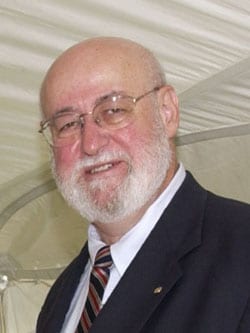WHOI Chemist and Dean to Receive 2003 Ketchum Award
June 25, 2003
Dr. John Farrington, a chemical oceanographer who conducted pioneering research on petroleum in the marine environment and the mobility of contaminants such as polychlorinated biphenyls (PCBs) in seafloor sediments, will receive the 2003 Bostwick H. Ketchum Award from the Woods Hole Oceanographic Institution (WHOI).
Farrington, currently Vice President for Academic Programs and Dean at the Institution, will receive the award, one of the Institution’s highest honors, in ceremonies at WHOI this fall. He is the first scientist at the Institution to receive the Ketchum Award, established in 1983 and previously given to scientists worldwide who demonstrate innovative coastal research, leadership in the scientific community, and attention to the effects of marine pollution on the coastal environment and society. Other selection criteria include a history of collaboration with scientists in other disciplines, serving as an inspiration to students and younger scientists, effectively translating research results into the policy arena, and through research addressing environmental effects of society’s activities in the coastal zone.
“This is a wonderful honor for John and recognizes how much he has accomplished for the ocean sciences community and for society as a whole,” WHOI President and Director Robert Gagosian said in announcing this year’s award. “It is especially gratifying that one of our own staff, who are judged by the highest standards, is being presented with such an honor named for a colleague.”
The Ketchum Award is presented by the Institution’s Rinehart Coastal Research Center and Coastal Ocean Institute and has been given 12 times since 1984. The most recent recipient was Dr. Nancy Rabalais of Louisiana Universities Marine Consortium, who was honored in January 2002 and presented her award lecture on “Mississippi River and Coastal Water Quality: Linking the Gulf of Mexico with the Continent.”
Farrington conducted pioneering work in his career on inputs and fates of organic contaminants in coastal and open ocean sediments, including pore waters, especially the role of colloids and black carbon or soot and bioavailability of the contaminants. His work furthered understanding of the processes and transformations associated with the transfer of molecular biomarker signatures from the water column to the underlying sediments. His leadership in the scientific community has been demonstrated by his role as one of the initial principal investigators in the Mussel Watch program from 1976 to 1980; the program was a prototype for the operational program at NOAA for monitoring chemical contaminants in US coastal waters. Farrington directed the WHOI Coastal Research Center in its early years and participated in numerous activities for the National Research Council on contaminants in the marine environment and science policy interactions.
Farrington was appointed Associate Director for Education and Dean of Graduate Studies at WHOI in 1990. Following completion of undergraduate and master’s degrees at Southeastern Massachusetts University, now UMASS Dartmouth, and a PhD degree at the University of Rhode Island, he joined the Institution in 1971 as a Postdoctoral Investigator. He subsequently held successive positions in the Chemistry Department for 17 years, and simultaneously for six years served as Director of the WHOI Coastal Research Center. In 1988 he was appointed Michael P. Walsh Professor and Director of the Environmental Sciences Program at the University of Massachusetts, Boston, serving in that capacity until his return to WHOI in 1990. He was named Vice President for Academic Programs and Dean in 2002.
He has published more than 90 scientific papers and 15 general interest articles on marine organic geochemistry, biochemistry of marine organisms, and environmental quality issues. He has served on committees and panels for international, national, and local organizations including the UNESCO-Intergovernmental Oceanographic Commission, National Academy of Sciences, National Science Foundation, Office of Naval Research, Commonwealth of Massachusetts, Lloyd Center for Environmental Studies, and Bermuda Biological Station for Research (Trustee). He has supervised 12 graduate students or postdoctoral researchers and has participated in four major field programs and 18 oceanographic cruises, eight as chief scientist.
The B. H. Ketchum Award was established by the Woods Hole Oceanographic Institution in 1983 in tribute to the late Bostwick H. “Buck” Ketchum, an internationally respected oceanographer. Ketchum was associated with WHOI for 40 years and was a leader in the development of biological oceanography. Buck Ketchum’s pioneering research provided the basis of understanding of productivity of the oceans, and his early work is still cited by scientists in the field. In later years he turned his attention to the effects of human activities on the coastal zone and the need for research into problems in that area. At the time of his death in 1982 he was one of four co-editors of a six-volume series Wastes in the Oceans published by John Wiley & Sons. He retired in 1977 as Associate Director of the Institution. An endowment has been raised, much of it from friends and colleagues, to support an annual lecture in Woods Hole by an internationally recognized scientist or a longer visit by a younger researcher.
About WHOI
WHOI is a private, independent marine research and engineering, and higher education organization located in Falmouth, MA. Its primary mission is to understand the oceans and their interaction with the Earth as a whole, and to communicate a basic understanding of the ocean’s role in the changing global environment. Established in 1930 on a recommendation from the National Academy of Sciences, the Institution is organized into five departments, interdisciplinary institutes and a marine policy center, and conducts a joint graduate education program with the Massachusetts Institute of Technology.

